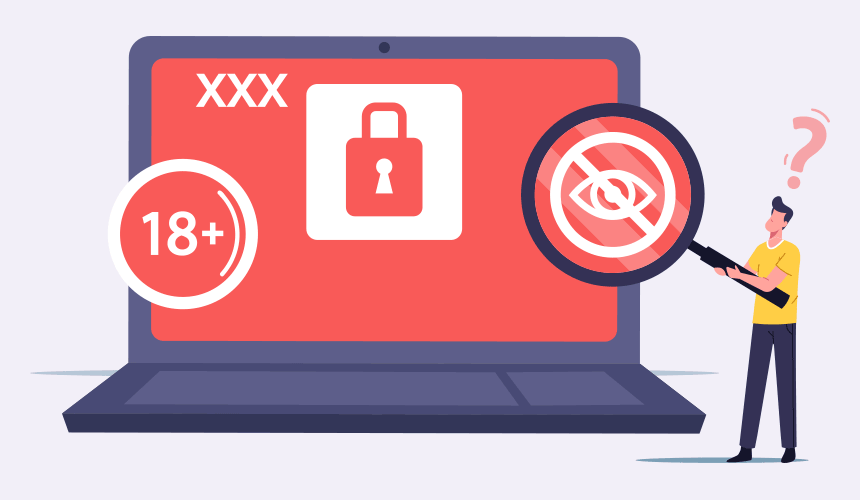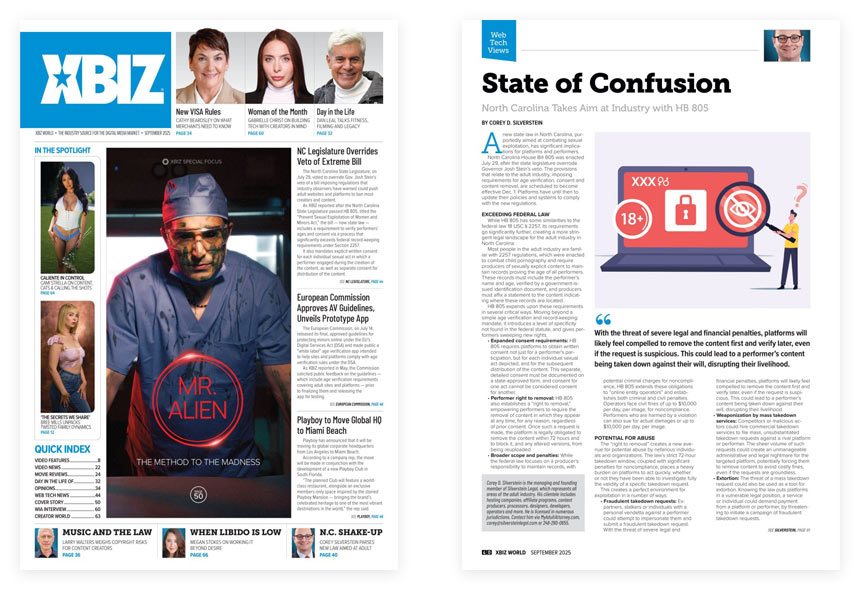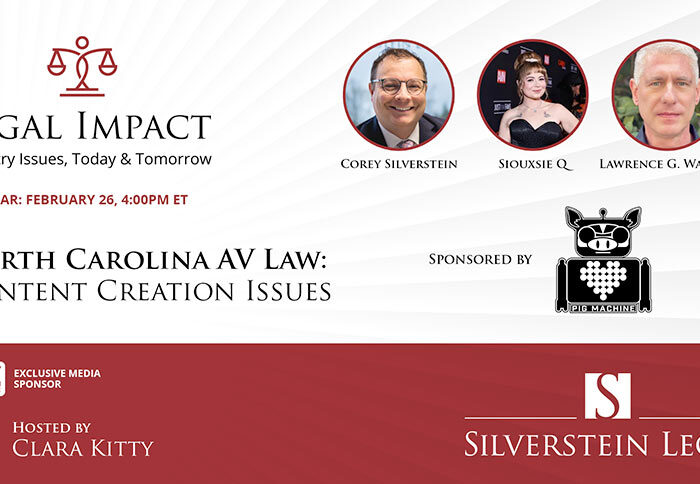Cyberspace (February 4, 2026) - Corey D. Silverstein, the driving force behind MyAdultAttorney.com and Adult.Law,…

North Carolina House Bill 805
An act originally aimed at combating sexual exploitation in the adult entertainment industry has become a wide-ranging law in North Carolina, with significant implications for performers, platforms, and public policy on a number of unrelated issues. North Carolina House Bill 805, which was recently enacted by the state legislature, was initially a bipartisan effort to purportedly protect individuals from having nonconsensual sexually explicit content distributed online. However, as the bill progressed through the legislative process, it was amended to include a host of other provisions, particularly those related to transgender rights and parental oversight in schools.
Featured In The September 2025 Edition Of XBIZ World

Effective Date of the Law
The legislative process for HB 805 concluded on July 29, 2025, when the North Carolina General Assembly successfully overrode Governor Josh Stein’s veto. The law was ratified at that time, but it does not go into effect all at once. The sections of the bill that relate to the adult entertainment industry — specifically the requirements for age verification, consent, and content removal — are scheduled to become effective on December 1, 2025. Other provisions, such as those related to the use of state funds for gender-affirming care for inmates, became effective earlier on July 1, 2025. This staggered implementation means that platforms and performers have until December 1, 2025, to update their policies and systems to comply with the new regulations.
The Evolution of HB 805
The original intent of HB 805, as introduced in the North Carolina House of Representatives, was to establish new regulations for websites that host sexually explicit material. The bill, titled the “Prevent Sexual Exploitation of Women and Minors Act,” sought to create a legal framework that would ensure all individuals depicted in pornographic content were of legal age and had provided explicit consent for both the acts performed and the distribution of the content. This initial version of the bill received some bipartisan support, as it was seen as a measure to protect vulnerable individuals and combat human trafficking.
However, the bill’s trajectory changed dramatically after it was passed by the House and moved to the Senate. In the Senate, the bill was amended to include several provisions that have drawn criticism from civil rights groups and Democrats. These amendments included:
- A legal definition of sex based on biological characteristics, which would apply to all state administrative rules and policies.
- A prohibition on the use of state funds for gender-affirming care for prisoners.
- An extension of the statute of limitations for malpractice lawsuits against medical providers who perform gender transition procedures on adults.
- Requirements for schools to make their library catalogs public and allow parents to restrict their child’s access to certain books.
- A mandate that students on overnight school trips must share sleeping quarters only with members of the same biological sex, unless they are immediate family.
This broadened version of the bill was vetoed by Governor Josh Stein, who acknowledged the importance of protecting individuals from online exploitation but called the other provisions “mean-spirited.” The legislature, however, overrode the veto, and HB 805 became law.
Going Further Than Federal Law: The Requirements of HB 805 vs. 18 U.S.C. § 2257
While North Carolina’s HB 805 has been likened to the federal law 18 U.S.C. § 2257, its requirements go significantly further, creating a new and more stringent legal landscape for the adult entertainment industry. The federal law, often referred to as “the 2257 regulations,” was enacted to combat child pornography and requires producers of sexually explicit content to maintain records proving the age of all performers. These records must include the performer’s name and age, verified by a government-issued identification document, and producers must affix a statement to the content indicating where these records are located.
HB 805, however, expands upon these requirements in several critical ways. It introduces a level of specificity and performer control not found in the federal statute, moving beyond a simple age verification and record-keeping mandate.
Expanded Consent Requirements
The most notable departure from federal law is the explicit and granular consent mandate. Under 18 U.S.C. § 2257, the focus is on a performer’s age. HB 805 goes a step further by requiring platforms to obtain written consent for not just the performer’s participation, but for each individual sexual act depicted and for the subsequent distribution of the content. This separate, detailed consent must be documented on a state-approved form, and the consent for one act cannot be considered consent for another.
Performer Right to Removal
A groundbreaking provision of HB 805 is the establishment of a “right to removal.” The federal law does not grant performers the right to have their content taken down after it has been distributed. In contrast, North Carolina’s law empowers performers to request the removal of their content at any time, for any reason, regardless of prior consent. Once such a request is made, the platform is legally obligated to remove the content within 72 hours and to block it, and any altered versions, from being re-uploaded.
Broader Scope and Penalties
While the federal law focuses on a producer’s responsibility to maintain records and can lead to criminal charges for non-compliance, HB 805 extends these obligations to “online entity operators” and establishes both significant civil and criminal penalties. Operators face civil fines of up to $10,000 per day, per image, from the Attorney General for non-compliance. Performers who are harmed by a violation can also sue for actual damages or up to $10,000 per day, per image.
Additional Unrelated Provisions
The federal law is narrowly focused on the adult entertainment industry. HB 805, on the other hand, contains a wide range of provisions completely unrelated to its initial purpose. The inclusion of new legal definitions of sex, restrictions on gender-affirming care for prisoners, and changes to school policies on library books and parental rights are all outside the purview of 18 U.S.C. § 2257, making HB 805 a multi-faceted law with a much broader impact on public policy.
Unintended Consequences: The Potential for Abuse
While the “right to removal” is designed as a powerful tool to protect performers, this specific provision also creates a new avenue for potential abuse by nefarious individuals and organizations. The law’s strict 72-hour takedown window, coupled with significant penalties for non-compliance, places a heavy burden on platforms to act quickly, often before they can fully investigate the validity of a takedown request.
This creates a perfect environment for exploitation:
Fraudulent Takedown Requests
Ex-partners, stalkers, or individuals with a personal vendetta against a performer could attempt to impersonate them to submit a fraudulent takedown request. Platforms, facing the threat of severe legal and financial penalties, may feel compelled to remove the content first and verify later, even if the request is suspicious. This could lead to a performer’s content being taken down against their will, disrupting their career and livelihood.
Weaponization by Mass Takedown Services
The law’s mechanisms could be weaponized by commercial takedown services. These services could be hired by competitors or malicious actors to file mass, unsubstantiated takedown requests against a rival platform or performer. The sheer volume of these requests could create an unmanageable administrative and legal nightmare for the targeted platform, potentially forcing them to remove content to avoid costly fines, even if the requests are groundless.
Extortion
The threat of a mass takedown request could also be used as a tool for extortion. A service or individual could demand a payment from a platform or performer under the threat of initiating a campaign of fraudulent takedown requests, knowing the platform is in a vulnerable legal position.
Ultimately, a law supposedly intended to protect performers by giving them greater control over their content could, paradoxically, make them more vulnerable to the actions of others. The challenge for platforms will be to develop robust systems to authenticate takedown requests without violating the law’s strict deadlines, while the risk for performers is that the very tool designed to empower them could be used as a weapon to cause them harm.
A Jurisdictional Minefield: Ambiguity for Out-of-State Performers and Platforms
A significant and unresolved question surrounding HB 805 is the extent of its jurisdictional reach. As a North Carolina state law, it is unclear how it can be enforced against performers and platforms that have no physical presence in the state. This ambiguity creates a legal minefield for anyone in the adult entertainment industry who operates across state lines.
The law’s language does not explicitly define how it applies to out-of-state entities. This leaves several key questions unanswered:
Does the law apply to content created by an out-of-state performer?
A performer living in California, for instance, who uploads content to a platform, may not be aware of, or subject to, North Carolina’s specific requirements. This could create a legal conflict if their content is made available to residents of North Carolina.
Does it apply to platforms located outside of North Carolina?
A platform based in Europe or another U.S. state that serves a global audience, including North Carolina residents, could theoretically be subject to the law. This would put them in the difficult position of having to comply with a patchwork of state-level regulations from every jurisdiction where their content is accessed, or face legal action.
What constitutes a sufficient connection to North Carolina?
Legal principles of jurisdiction generally require a defendant to have “minimum contacts” with a state for its laws to apply. It is unclear if merely making content accessible to a North Carolina resident on the internet is enough to establish such a connection, especially for performers and platforms that are not otherwise doing business in the state.
For platforms, the safest but most burdensome course of action would be to implement “geo-blocking” — restricting access to North Carolina residents entirely, or, alternatively, to adopt the most stringent laws from every state to ensure compliance everywhere. For performers, the uncertainty means that content they produce, even in a state with different laws, could be subject to North Carolina’s regulations if it is distributed to a user there. This lack of clarity on jurisdiction creates a major legal risk for the entire industry.
Potential Constitutional Challenges to HB 805
Given its broad scope and the nature of its provisions, HB 805 is highly susceptible to constitutional challenges, particularly on First Amendment and Fourteenth Amendment grounds. However, any such challenge will likely face headwinds from the recent Supreme Court decision in Free Speech Coalition, Inc. v. Paxton.
Implications of FSC v. Paxton
In a landmark 6-3 decision on June 27, 2025, the Supreme Court upheld a Texas law requiring websites with sexually explicit content that is “obscene to minors” to verify the age of their visitors. This ruling is a significant departure from previous First Amendment jurisprudence, which typically applied “strict scrutiny” — a very high bar — to laws that regulate speech based on its content. The Court in Paxton instead applied “intermediate scrutiny,” a less demanding standard, reasoning that the Texas law’s age verification requirement was a permissible means of enforcing a state’s traditional power to protect minors from harmful content. The Court concluded that any burden on the free speech rights of adults was merely incidental, rather than a direct content-based restriction.
First Amendment (Freedom of Speech)
The Paxton decision fundamentally changes the legal landscape for challenging laws like North Carolina’s HB 805. The argument that HB 805’s age verification and content regulation provisions are an unconstitutional restriction on free speech is now significantly weakened. The Supreme Court’s new standard of intermediate scrutiny gives states far more leeway to enact and enforce laws that require age verification for adult content. While opponents of HB 805 could still argue that the law’s specific requirements, such as the granular consent forms and the “right to removal” provisions, are more burdensome than the Texas law and do not survive even intermediate scrutiny, the path to a successful challenge is now much more difficult.
Fourteenth Amendment (Equal Protection and Due Process)
The bill’s provisions related to gender identity and transgender individuals remain ripe for legal challenge. The law’s definitions of “sex,” “male,” and “female” based solely on biological characteristics at birth could be argued to violate the Equal Protection Clause by discriminating against transgender and gender nonconforming individuals. Similarly, the provision that extends the statute of limitations for malpractice lawsuits against medical providers who perform gender transition procedures could be challenged as a discriminatory measure that unfairly targets a specific type of medical care. Critics could argue this provision lacks a rational basis and violates the fundamental rights of individuals to make personal healthcare decisions.
Dormant Commerce Clause
The law’s expansive reach could also face challenges under the Dormant Commerce Clause, which prohibits states from passing legislation that discriminates against or unduly burdens interstate commerce. By imposing strict, North Carolina-specific regulations on platforms that operate nationally and internationally, HB 805 could be seen as creating a significant and unconstitutional burden on the flow of commerce on the internet.
Compliance for Performers and Platforms
The law creates a new set of challenges for both performers and platforms in the adult entertainment industry.
For Platforms
The compliance burden is significant. They must implement robust age and identity verification systems to ensure every performer meets the legal requirements. The need to obtain separate, written consent for each act and for distribution is a major change to standard industry practices. The strict 72-hour removal window for performer-requested content, along with the requirement to prevent re-uploading, will necessitate the development of new content management and moderation tools. Failure to comply can result in severe penalties, including a civil penalty of up to $10,000 per day, per image, from the Attorney General. Individuals depicted in content that violates the law can also sue for actual damages or up to $10,000 per day, per image.
For Performers
While the bill’s intent is to provide greater protection for performers, it also places new requirements on them. Performers must be prepared to provide a valid form of government-issued identification to platforms to prove their age. They will also need to sign specific, state-approved consent forms for each project. However, the law also empowers performers by giving them the right to request the removal of their content at any time, a provision that could significantly change the power dynamics within the industry. This is particularly relevant for performers who may wish to leave the industry or whose circumstances change, as it provides a legal avenue to regain control over their digital footprint.
In summation, North Carolina’s HB 805 represents a complex piece of legislation that has created new legal and operational requirements for the adult entertainment industry. While it was initially framed as a protective measure against online exploitation, its expanded scope and novel provisions, which extend far beyond the federal record-keeping requirements of 18 U.S.C. § 2257, have made it a controversial and far-reaching law with implications that extend well beyond the world of adult content. Its “right to removal” provision, while well-intentioned, introduces new vulnerabilities that could be exploited, and the law’s lack of clarity on jurisdictional reach creates a new layer of legal and operational risk for anyone in the online content space. Platforms and performers in the industry should prepare for these changes as the law’s core provisions take effect on December 1, 2025.
This article does not constitute legal advice and is provided for your information only and should not be relied upon in lieu of consultation with legal advisors in your own jurisdiction. It may not be current as the laws in this area change frequently. Transmission of the information contained in this article is not intended to create, and the receipt does not constitute, an attorney-client relationship between sender and receiver.
About Silverstein Legal
Founded in 2006 by adult entertainment lawyer Corey D. Silverstein, Silverstein Legal is a boutique law firm that caters to the needs of anyone working in the adult entertainment industry. Silverstein Legal’s clients include hosting companies, affiliate programs, content producers, processors, designers, developers, and website operators.




